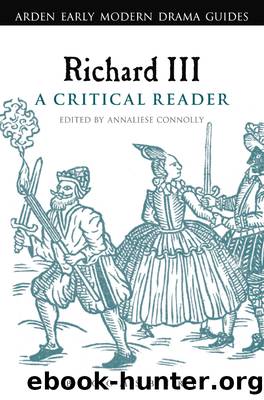Richard III: A Critical Reader (Arden Early Modern Drama Guides) by Annaliese Connolly

Author:Annaliese Connolly
Language: eng
Format: mobi
Tags: Drama, Non-Fiction, Shakespearean, Literary Criticism, Plays
Publisher: The Arden Shakespeare
Published: 2013-10-23T23:00:00+00:00
Conclusion
In overturning the law, Richard reveals to his audience the inadequacy of a legal solution. How can Clarence, Anne and Hastings plead law, how can Buckingham plead the contract of a promise, when faced with Richard? The only adequate response to Richard is to suspend law in kind, to answer cunning with cunning, and force with force. But this answer lies at the heart of the play’s dilemma. Can rulers undermine law in the name of law? Can subjects illegally snare Richard in the name of the state? Richard’s charisma, his power and his tyranny invites us as the audience to demand a suspension of law and custom, to demand a state of emergency in response to Richard’s own emergency politics. As Meron writes: ‘Richmond presents strong justification for the right of revolt against a tyrant, especially one that usurped the Crown and is thus an illegitimate monarch. By comparing Richard III to Machiavelli, the counselor of evil, Shakespeare emphasizes that in Elizabethan times Richard was an approved target and a ruler against whom rebellion was, exceptionally, justified.’22 Even if the play justifies such rebellion, however, it equally reveals the dangers of the pattern established by Richard, one that undermines law and custom in such a way as to compromise it permanently. The state of exception, as Benjamin writes, threatens to become the rule or norm. Thus, even as the invading Richmond answers a fantasy – in terms of our desire for retribution and revolt against Richard – his ascension reinforces some of the more troublingly lawless aspects of Richard’s reign. Richmond is not the people’s prince. Instead, undermining the law and legal recourse, Richmond’s invasion signals the embrace of necessity by a handful of elite men.
Indeed, the play’s two triumphant sovereigns, Richard and Richmond, stand in parallel relation to one another. Both seek the hand of Elizabeth; both usurp the crown from a ruling prince; both dream of their own exceptionalism the night before battle, one imagining himself exceptionally worthy, the other exceptionally condemned; and both deploy nationalist rhetoric based in emotion and instinct, rather than law and reason. Fight, as Richmond says, ‘against this country’s foes’ (5.3.257) against ‘God’s enemy’ (252, 253) the ‘bloody tyrant’ (246) and to save our ‘children’s children’ (262). Fight, as Richard declares, to defend England against ‘bastard Bretons’ (333), a ‘scum of Bretons’(318) who seek to ‘ravish our daughters’ (337).The play does not then end with Richard’s excision from the kingdom as its sole pariah or its predetermined villain. Richard might represent a particularly stark form of exceptionalism, drawing on physical and political distortion of forms. But the play does not contain Richard’s threat in his villainous body. Instead Richard’s opposition becomes increasingly cunning, and men like Richmond lay claim to an exceptional status, coming from foreign exile to usurp the throne. Richard thus pollutes sovereign power, inviting even the audience to sanction lawless resistance to counter him, thereby ensuring a permanent state of exception for England. The criminality becomes, thanks to Richard’s cunning, endemic.
Download
This site does not store any files on its server. We only index and link to content provided by other sites. Please contact the content providers to delete copyright contents if any and email us, we'll remove relevant links or contents immediately.
| Ancient & Classical | Arthurian Romance |
| Beat Generation | Feminist |
| Gothic & Romantic | LGBT |
| Medieval | Modern |
| Modernism | Postmodernism |
| Renaissance | Shakespeare |
| Surrealism | Victorian |
4 3 2 1: A Novel by Paul Auster(11049)
The handmaid's tale by Margaret Atwood(6852)
Giovanni's Room by James Baldwin(5878)
Big Magic: Creative Living Beyond Fear by Elizabeth Gilbert(4723)
Asking the Right Questions: A Guide to Critical Thinking by M. Neil Browne & Stuart M. Keeley(4574)
On Writing A Memoir of the Craft by Stephen King(4213)
Ego Is the Enemy by Ryan Holiday(3991)
Ken Follett - World without end by Ken Follett(3972)
The Body: A Guide for Occupants by Bill Bryson(3801)
Bluets by Maggie Nelson(3710)
Adulting by Kelly Williams Brown(3670)
Guilty Pleasures by Laurell K Hamilton(3586)
Eat That Frog! by Brian Tracy(3514)
White Noise - A Novel by Don DeLillo(3435)
The Poetry of Pablo Neruda by Pablo Neruda(3367)
Alive: The Story of the Andes Survivors by Piers Paul Read(3310)
The Bookshop by Penelope Fitzgerald(3226)
The Book of Joy by Dalai Lama(3217)
Fingerprints of the Gods by Graham Hancock(3212)
